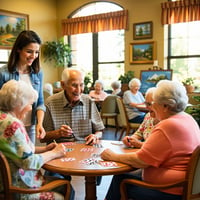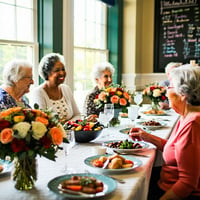Assisted Living Doesn’t Mean Losing Independence Here’s the truth: assisted living is not about...
The Therapeutic Benefits of Gardening for Seniors
🌻 The Therapeutic Power of Gardening for Seniors: How Digging in the Dirt Helps Heal
“To nurture a garden is to feed not just the body, but the soul.” — Alfred Austin
For many seniors, growing older can come with physical limitations, emotional transitions, and changes in routine. But one timeless, restorative activity has stood the test of time: gardening.
Beyond its surface-level appeal, gardening offers real, science-backed therapeutic benefits for older adults. It’s not just about the flowers — it’s about connection, movement, memory, and meaning.
🌿 Gardening as Therapy: More Than a Hobby
Doctors, therapists, and senior care professionals increasingly recognize horticultural therapy — the use of gardening as a structured therapeutic activity — as a powerful tool for aging well. Research shows:
-
Gardening lowers cortisol levels (the stress hormone)
-
Exposure to green spaces reduces symptoms of depression and anxiety
-
Seniors involved in gardening report higher self-esteem and life satisfaction
In fact, the American Horticultural Therapy Association (AHTA) cites gardening as one of the most effective natural ways to support holistic senior wellness.
🧠 Cognitive Benefits: Stimulating the Aging Brain
Memory, attention, and executive function all benefit when older adults engage with gardening. Activities like choosing plants, planning a garden, or recalling past growing seasons create:
-
Memory retrieval opportunities (especially powerful for those with dementia)
-
Problem-solving (watering schedules, pest control, plant spacing)
-
Sensory stimulation (touch, smell, sight, sound — all in one experience)
🧩 Did you know? A Japanese study found that daily interaction with nature significantly slowed cognitive decline in seniors over a five-year period.
💪 Physical Health Perks: Gentle Movement with Purpose
Gardening naturally encourages physical activity, which helps seniors maintain strength, flexibility, and circulation. Tasks like digging, watering, and planting help:
-
Improve joint mobility and fine motor skills
-
Encourage balance and coordination
-
Offer sunlight exposure for Vitamin D and mood regulation
And because gardening is inherently enjoyable, it feels more like leisure than exercise — a big plus for seniors who struggle with motivation for movement.
💚 Emotional & Psychological Healing
Gardening gives seniors something many crave later in life: a sense of purpose.
🌸 Watching something grow nurtures patience, pride, and joy.
🌸 Being responsible for a plant creates a routine — a reason to get outside.
🌸 Seasonal change offers rhythm, anticipation, and reflection.
Nature soothes, and that effect deepens when we’re part of it — not just observers, but active participants.
👥 Growing Together: The Social Benefits of Shared Gardens
Gardening is often thought of as a solo activity, but it’s surprisingly social — especially in senior living environments or intergenerational spaces.
-
Community gardens foster collaboration and teamwork
-
Gardening clubs create a shared sense of purpose
-
Seasonal gardening events offer opportunities for family visits and engagement
“When we dig together, we talk together,” shared one 86-year-old resident gardener in a recent PBS segment on aging and outdoor wellness. “You feel less alone out here.”
🪴 Tips to Bring Gardening into Your Loved One’s Life
Whether your family member lives at home or in a senior community, here are a few ideas to make gardening accessible and fun:
-
Start Small: Container gardens or window boxes are perfect for beginners.
-
Use Raised Beds: Easier on backs, knees, and wheelchairs.
-
Pick Sensory-Rich Plants: Think fragrant herbs (like lavender), soft textures (like lamb’s ear), or colorful flowers.
-
Choose Quick Wins: Radishes, cherry tomatoes, and marigolds all grow fast.
-
Garden Together: Turn it into a bonding activity — and watch how it sparks stories and smiles.
🏡 How Assisted Living Can Support Garden Therapy
While family gardening is valuable, structured programs in assisted living can take things further. Communities that integrate outdoor gardening into their lifestyle programs often report:
-
Improved resident engagement and lower isolation
-
Decreased use of depression-related medication
-
Stronger relationships between residents and staff
At Sarawood Assisted Living, we’ve created accessible outdoor spaces where residents can connect with nature — and with each other — every day. Raised beds, shaded areas, and seasonal planting events make gardening both safe and meaningful.
✅ Final Takeaway: Nature Heals — Let’s Grow With It
Gardening gives back far more than we put in. For older adults, it provides connection, routine, stimulation, and joy. It’s one of the simplest ways to enhance well-being — and one of the most overlooked.
If you’re exploring ways to help your loved one thrive in their later years, consider gardening not as an activity, but as therapy. Whether at home or in a community like Sarawood, the benefits take root quickly.
📘 Bonus Download:
👉 Free PDF: “5 Simple Garden Projects to Do With Your Senior Loved One”
🌿 Ready to See the Power of Gardening in Action?
At Sarawood Assisted Living, we believe wellness blossoms in the right environment — and sometimes all it takes is soil, sunlight, and a little support.
If your loved one finds joy in nature, wants to stay active, or could benefit from a calming, purpose-filled routine, we’d love to show you how our therapeutic garden program brings daily joy to our residents.
👉 Schedule a personal tour to explore our outdoor spaces and learn more about our holistic approach to senior wellness.
👉 Or contact us with your questions — we’re here to help you find the right fit for your family.
Because at Sarawood, we don’t just plant gardens —
we grow connection, health, and happiness — one resident at a time.



